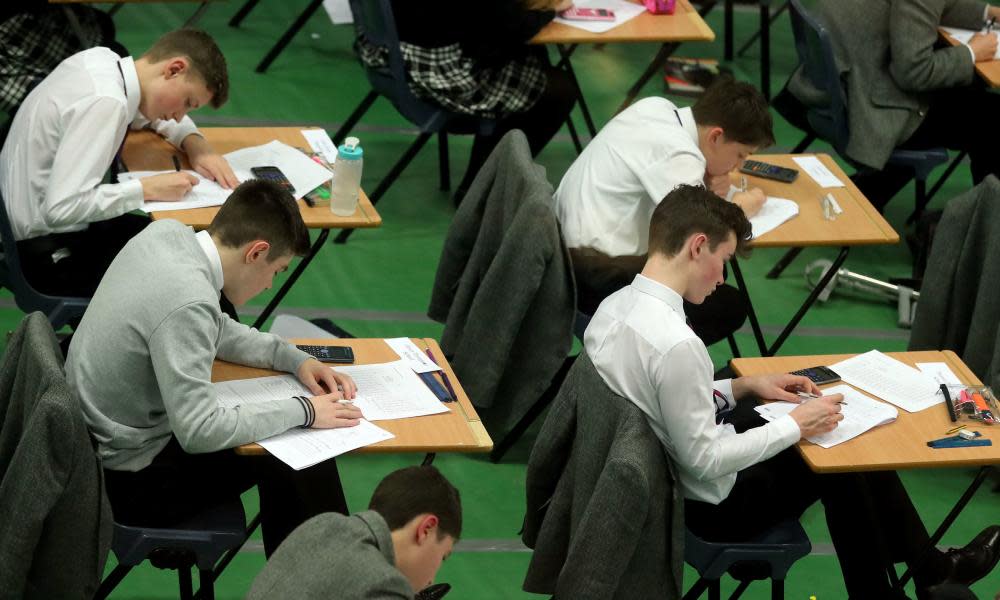Fears of clearing chaos as A-level results predicted to be unexpectedly low

Universities are warning that Thursday’s A-level results in England and Wales could be another marking fiasco like the one in 2020, with a “dramatic swing” back to less generous results, and disadvantaged pupils “elbowed out” as thousands fall short of their predicted grades and miss their university places.
After two years of record results, the government told this year’s school leavers, who were the first to sit A-level exams since the pandemic began, that exams would be graded at a “midpoint” between pandemic rises and normal 2019 levels. However, universities now fear that unexpectedly low results in the Scottish Highers, which pupils received last Tuesday, are likely to be replicated in England on Thursday morning. The overall pass rate for Highers fell from 89.3% in 2020 to 78.9% this summer.
Andrew Hargreaves, a former director at admissions service Ucas, and co-founder of dataHE, a consultancy that advises universities on admissions, told the Observer: “There are frantic discussions going on about this in universities. Many fear we might have another year akin to 2020 when all the headlines were about the A-level fiasco.”
After schools closed as a result of the pandemic in March 2020, and students were unable to sit exams, the exams regulator drew up a controversial standardisation algorithm to award A-level grades. This led to nearly 40% of predicted grades being downgraded and many students, especially those from poorer backgrounds, losing university places. Students and parents reacted with fury and the government was forced into a humiliating U-turn back to teacher-assessed grades.
Although A-levels in England and Wales are overseen by different independent regulators, and a spokesperson for the Department for Education said that it would be “incorrect to use Scottish results as a basis for speculation”, Hargreaves said the Scottish results could be a good indicator of what is coming. He added: “It is a much more dramatic swing than expected and it is certainly not a midpoint.”

Competition for places at the most selective universities has been exceptionally fierce this year, with institutions cutting back on the number of offers made after being forced to take more students than they wanted during the pandemic, and a demographic surge in the number of 18-year-olds.
In recent years, before the pandemic, strong candidates who slipped a grade stood a good chance of talking their way into a leading institution on the phone, but experts say now that is much less likely, especially in popular subjects. Hargreaves urged students waiting for results to start researching a plan B just in case, while Lee Elliot Major, professor of social mobility at Exeter University, warned that Thursday’s results could be disastrous for social mobility. He said selective universities may be unable to “take a chance” on many promising disadvantaged candidates because their grades turn out to be too low. “The real fear is that many disadvantaged students, whose learning was disproportionately damaged by the pandemic, will be elbowed out,” he added. “This year will be the hardest admissions round in living memory for many applicants.”
Victoria Panni from Hampshire, whose son Taylor is hoping to study sociology at Bournemouth University, said: “I saw that Scottish students weren’t getting their predicted grades and I’ve been talking to my son about backup plans. It is a very worrying time.”
She said: “It seems the government and examining boards totally ignored the fact that for the first year of A-levels the pupils had two lockdowns to endure and most of their learning was alone online.”
Mark Garratt, director of marketing, communications and recruitment at Anglia Ruskin University, said students may not realise that clearing is already open and they can contact universities now to see if they have places available in the subjects they want. “There are still going to be plenty of places at universities across the country,” he said. “Preparing in advance can mitigate the stress when students receive their results.”
The DfE said: “The pattern of grades in each subject in England will be based around a midpoint between the proportion of each grade in that subject in 2021 and 2019. This is not the same policy employed in Scotland. Ucas expects the majority of students to secure their place at their firm choice this year, and our focus has been on working with universities to ensure offers reflect the grades students will receive this summer.”

 Yahoo News
Yahoo News 
